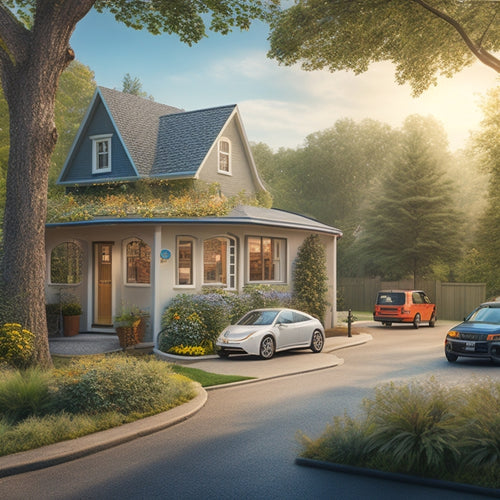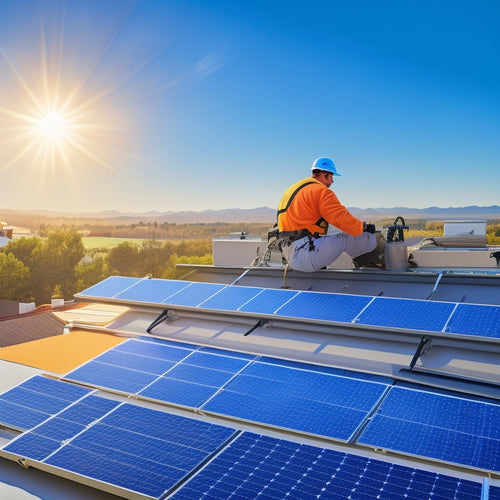
What Is the Cost to Put in Solar Panels
Share
You're likely considering solar panels for your home, and the most significant factor in your decision is the upfront cost, which typically ranges from $15,000 to $30,000, depending on the system size, installation complexity, and local incentives. Average installation costs range from $2.50 to $3.50 per watt, with permits and inspections adding $2,000 to $5,000 to the overall bill. However, your long-term savings of $400 to $1,000 annually can lead to payback in 5-7 years. Understanding these cost factors is just the beginning - as you investigate further, you'll uncover more subtleties that can help you make an informed decision.
Key Takeaways
- The average cost of a solar panel system, including installation, ranges from $15,000 to $30,000.
- Installation costs average $2.50 to $3.50 per watt, with total system costs influenced by size and project complexity.
- The type and quality of solar panels, such as monocrystalline or polycrystalline, affect overall costs and efficiency.
- Local incentives, rebates, and federal tax credits can significantly reduce installation costs.
- Ongoing maintenance expenses, including monitoring and cleaning, can add $100 to $1,300 annually to the overall cost.
Average Cost of Solar Panels
On average, a homeowner can expect to pay between $15,000 and $30,000 for a solar panel system that meets their energy needs. This cost includes the installation of solar panels, inverters, mounting hardware, and other necessary equipment.
However, you may be able to reduce this cost through solar panel financing options, such as loans or power purchase agreements. These financing options can help you spread the upfront cost of solar panels over several years, making them more affordable.
The cost of solar panels is offset by the solar energy savings you'll enjoy over time. With solar panels, you can generate your own electricity and reduce your reliance on the grid.
This can lead to significant savings on your energy bills, especially if you consume a lot of power during the day. In fact, you can save up to $500 per year on your energy bills, depending on your energy usage and the size of your solar panel system.
Factors Affecting Solar Panel Cost
What determines the final cost of a solar panel system? As you consider investing in solar energy, it's crucial to understand the factors that impact the overall expense.
The type and quality of solar panels you choose greatly affect the cost. High-efficiency panels with advanced technology come at a higher price point than standard panels.
In addition, the size of your system, measured in watts, directly correlates with the cost. A larger system requires more panels, increasing the expense.
Your location also plays a role in the final cost. Local incentives, such as tax credits or rebates, can reduce the upfront cost.
Moreover, the complexity of the installation, including the roof's size, shape, and material, can impact labor costs.
When evaluating financing options, consider the return investment (ROI) of your solar panel system. While the initial cost may seem overwhelming, solar panels can increase your property value and reduce energy bills, providing long-term savings.
Cost of Solar Panel Installation
When considering the cost of solar panel installation, you'll need to factor in the average installation costs, which can range from $2.50 to $3.50 per watt, depending on the complexity of the job and the location.
These costs cover the labor, equipment, and permits required to get your system up and running.
Your total system costs will also depend on the size of the system you need, which will impact the overall price tag.
Average Installation Costs
Economies of scale play a significant role in determining the average installation cost of solar panels. As you consider solar panel financing options, it's important to understand that larger systems tend to be more cost-effective. For instance, installing a 10-kilowatt system will be more cost-efficient than installing two 5-kilowatt systems.
The average installation cost for residential solar panels ranges from $2.50 to $3.50 per watt, depending on the system size and quality of equipment. For a typical 5-kilowatt system, the total installation cost would be around $12,500 to $17,500.
Commercial installations typically have lower costs per watt, ranging from $2.00 to $3.00.
Keep in mind that the installation timeline also affects the overall cost. Faster installations typically result in lower labor costs. Experienced installers can complete a standard residential installation within a few days, while larger commercial projects may take several weeks or even months.
Total System Costs
In calculating the total system cost of solar panel installation, you'll need to reflect on several key components beyond the initial equipment purchase.
These include the cost of installation, which can range from $2.50 to $3.50 per watt, depending on the complexity of the project and the installer's rates. You'll also need to factor in the cost of permits, inspections, and connection fees, which can add up to $2,000 to $5,000 to your overall bill.
Additionally, you may need to take into account the cost of upgrading your electrical panel or replacing your roof, if necessary. These expenses can add thousands of dollars to your total system cost.
However, it's important to remember that financing options are available to help offset these costs. Many solar installers offer financing plans or partnerships with lenders that can help you spread the cost of installation over several years.
And, with long-term savings of $400 to $1,000 per year on your electricity bill, solar panels can pay for themselves in as little as 5-7 years.
Solar Panel System Size Matters
When you're planning to install solar panels, you'll need to evaluate the system size, which comes in various options, including 2 kW, 5 kW, and 10 kW systems.
The size you choose will directly impact the energy output, with larger systems producing more electricity.
Additionally, the system size you select will also determine the space requirements, which can be a critical factor, especially for homes with limited roof space.
System Size Options
You're likely wondering what solar panel system size is right for your energy needs. The system size you choose will considerably impact the overall cost of your solar panel installation.
To determine the ideal system size, you'll need to assess your solar needs. This involves calculating your average daily energy usage in kilowatt-hours (kWh).
A typical residential solar panel system ranges from 2 to 10 kilowatts (kW). A smaller system size may be suitable for a small to medium-sized home with minimal energy demands. However, if you have a larger home or multiple electric vehicles, you may require a larger system size to meet your energy needs.
When selecting a system size, consider factors such as your roof size, local building codes, and available space for equipment.
It's crucial to strike a balance between meeting your energy demands and staying within your budget. A reputable solar installer can help you determine the ideal system size for your specific situation, ensuring you maximize your solar savings while minimizing your upfront cost.
Energy Output Impact
How much electricity can you realistically expect your solar panel system to produce? The answer lies in the system's size, energy efficiency, and performance monitoring. A larger system doesn't always mean more energy output, as factors like panel quality, installation, and maintenance also play an essential role.
Here are three key takeaways to reflect on:
-
System size: A 5-kilowatt (kW) system will produce more electricity than a 3-kW system, but the increase in output may not be directly proportional to the increase in size.
-
Panel efficiency: High-efficiency panels can generate more electricity per hour of sunlight than lower-efficiency panels, even if they're the same size.
-
Performance monitoring: Regular monitoring of your system's performance helps identify and address any issues that might be reducing energy output, ensuring you get the most out of your investment.
When it comes to energy output, every detail matters. By understanding these factors, you can optimize your solar panel system for maximum energy production and enjoy the benefits of renewable energy.
Space Requirements Matter
A larger solar panel system requires more space, and the available roof or land area often determines the maximum system size.
When evaluating your property, you'll need to examine land availability and potential obstructions. Shading analysis is vital to identify areas that receive sufficient sunlight throughout the day. This analysis will help you determine the best system size and configuration for your specific location.
You'll need to assess your roof's size, orientation, and pitch to determine the maximum number of solar panels that can be installed.
For ground-mounted systems, you'll need to evaluate the available land area, considering any obstacles or constraints. A thorough site assessment will help you identify the most suitable location for your solar panel system, ensuring maximum energy output and best system performance.
Type of Solar Panels Used
The crystalline silicon solar panels that adorn rooftops worldwide are a demonstration to the versatility of photovoltaic technology.
You've got options when it comes to choosing the type of solar panels for your installation.
-
Monocrystalline panels: These are the most efficient, with a higher power output per hour of sunlight. They're more expensive, but they'll provide the most energy per hour of sunlight.
-
Polycrystalline panels: These are less expensive than monocrystalline panels but still offer high efficiency. They're a popular choice for residential installations.
-
Thin film technology: This type of panel uses a thin layer of photovoltaic material and is less efficient than crystalline silicon panels. However, it's a more affordable option and can be a good choice for large-scale installations.
When choosing a solar panel type, consider factors like solar panel efficiency, solar panel lifespan, and environmental impact.
Monocrystalline panels may be more expensive upfront, but they'll last longer and produce more energy over their lifespan.
Thin film technology, on the other hand, may require more space but is a more budget-friendly option.
Roof Size and Complexity
Your roof's size and complexity play a significant role in determining the cost of solar panels. The larger your roof, the more solar panels you'll need to generate the desired amount of power, which increases the overall cost.
Additionally, a complex roof with multiple levels, skylights, or chimneys requires more labor and materials to install solar panels, adding to the expense.
Roof orientation is also vital, as south-facing roofs receive the most sunlight and are ideal for solar panels. If your roof has an east- or west-facing orientation, you may need more panels to generate the same amount of power, increasing the cost.
Shading issues, such as trees or nearby buildings casting shadows on your roof, can also impact the performance of your solar panels and require additional equipment to mitigate the effects.
When evaluating your roof's complexity, consider factors like the number of vents, skylights, and chimneys, as well as the type of roofing material.
A thorough analysis of your roof's size and complexity will help you accurately estimate the cost of solar panels and guarantee a successful installation.
Local Incentives and Rebates
Optimism around renewable energy has spawned a multitude of local incentives and rebates, which can greatly reduce the cost of solar panels. You'll want to investigate these opportunities to maximize your savings.
-
Local Grants and Tax Credits: You may be eligible for local grants or tax credits that can offset a considerable portion of your solar panel installation cost. Research if your local government or utility company offers such incentives.
-
Utility Rebates and Financing Options: Your utility company might offer rebates or special financing options for solar panel installations. These can help reduce your upfront costs or provide low-interest loans.
-
Community Programs and State Incentives: Look into community programs or state incentives that can provide additional discounts or benefits. Federal benefits, such as the Solar Investment Tax Credit (ITC), can also help reduce your costs.
Remember to factor these incentives into your overall cost calculation. By taking advantage of these local incentives and rebates, you can considerably reduce the cost of your solar panel installation, making it more affordable and increasing your return on investment.
Battery Backup System Cost
As you investigate ways to maximize your solar panel savings, considering a battery backup system becomes a crucial step. This system enables you to store excess energy generated by your solar panels during the day for use during the night or in case of a power outage.
The cost of a battery backup system varies depending on the battery type and installation options you choose. You can opt for lead-acid batteries, which are a cost-effective option, or lithium-ion batteries, which offer higher efficiency and longer lifetimes.
Installation options range from a simple DIY setup to a more complex, professionally installed system. On average, a battery backup system can cost between $5,000 and $15,000, with the national average hovering around $10,000.
However, this cost can be offset by the savings you'll gain from having a reliable source of power during outages and peak energy hours. It's important to weigh the costs against the benefits and consider your energy needs before making a decision.
Ongoing Maintenance Expenses
Examine your solar panel system regularly to ascertain peak performance and prolong its lifespan. Regular monitoring helps detect potential issues before they become major problems, guaranteeing your system operates at its best.
You'll need to take into account the following ongoing maintenance expenses:
-
Monitoring systems: These systems track your solar panel performance, alerting you to any issues. Costs range from $100 to $300 per year, depending on the system's complexity.
-
Repair services: Although rare, repairs may be necessary. Budget $100 to $500 per repair, depending on the nature of the issue.
-
Cleaning frequency: Cleaning your solar panels regularly (every 6-12 months) guarantees maximum energy production. Cleaning costs range from $100 to $300 per cleaning, depending on the system size and location.
Keep in mind that performance degradation occurs naturally over time, reducing your system's energy output. However, many manufacturers offer warranty coverage for 25 years or more, covering repairs and replacements.
Additionally, evaluate insurance costs, which can range from $100 to $500 per year, depending on your location and system size. By factoring in these ongoing maintenance expenses, you'll be better prepared to enjoy the long-term benefits of your solar panel system.
Frequently Asked Questions
Can I Install Solar Panels Myself to Save Money?
You can attempt a DIY installation to save money, but be aware that it requires significant technical knowledge and may void warranties, potentially offsetting cost savings; it's essential to weigh the risks and benefits before deciding.
Will Solar Panels Increase My Property Value?
You'll likely see an enhancement in property value with solar panels, as they'll increase your energy savings and potentially lower your property tax, making your home more attractive to potential buyers and increasing its resale value.
How Long Does It Take to Install Solar Panels?
You'll typically spend 1-3 days waiting for permits, and 2-5 days on installation, but be prepared for potential installation challenges that can extend your timeline, such as complex roof layouts or electrical upgrades.
Can I Finance My Solar Panel Installation?
You can finance your solar panel installation through various solar financing options, such as solar loans, which offer benefits like flexible repayment terms, tax benefits, and no upfront costs, allowing you to utilize power without breaking the bank.
Do Solar Panels Work During a Power Outage?
You'll find that your solar panels won't function during a power outage, as they're designed to sync with the grid's frequency; however, you can invest in a battery backup system to guarantee continuous power supply during outages.
Related Posts
-

Waterproofing Solar Panels for Vehicles: A Step-by-Step Guide
When waterproofing solar panels for your vehicle, start by evaluating your energy requirements and selecting the righ...
-

Why Nearby EV Conversion Shops Matter to You
Having a nearby EV conversion shop means you'll experience the benefits of a more personalized, convenient, and susta...
-

3 Essential Steps for Solar Electricity Installation
To guarantee a successful solar electricity installation, you'll need to follow three essential steps. First, assess ...


